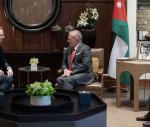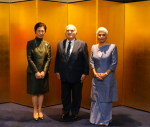You are here
True jihadist threat
May 17,2014 - Last updated at May 17,2014
Jordan’s Lower House of Parliament recently passed a sweeping, if controversial, anti-terror bill granting the state broad powers to detain and try citizens suspected of affiliation with terrorist group abroad in a bid to counter the growing threat posed by jihadist fighters returning from Syria.
Yet despite the over 40 articles and dozens of pages granting the government new legal tools in its renewed war on extremism, the pending law is not likely to protect the country from the true threat posed by jihadists north of the border.
A key article in the amended law broadens the definition of “terrorist acts” to include “joining or attempting to join”, the “direct and indirect funding” of and “attempting to recruit” for “any armed group or terrorist organisation in the Kingdom and abroad”.
After a fierce debate on the Parliament floor, lawmakers even approved Article 3 of the anti-terrorism law, which criminalises “the intent to commit acts damaging to the Kingdom’s relations with foreign countries” — a stipulation that in practice allows the government to detain and imprison citizens for their support for organisations or groups legal in Jordan, such as Muslim Brotherhood, but that were outlawed by neighbouring countries.
Officials highlighted the importance of the law as a vital tool in Jordan’s renewed war on Islamist militants in Syria, a battle that until now has been dependent on the vagueness of Article 148 of the Penal Code, which allows the courts to try and convict citizens for “acts unauthorised by the government”.
Despite pushing case after case through the State Security Court, convicting suspected jihadist sympathisers and fighters for “unauthorised acts” and for “travelling to Syria with the intent to join armed groups”, officials argued that Jordan was in need of a wider, legally sound, net to arrest all those who may support or be members of Syrian militias that may one day set their sights on Jordan.
The minister of interior urged the rapid ratification of the controversial bill in order to aid the work of military and intelligence agencies along the 370-kilometre Jordanian-Syrian border, which, he said, have been performing “the job of two countries as one”.
Yet, although alarming, neither the 2,000-plus Jordanians fighting alongside Islamist militias nor the 20-odd jihadists returning from Syria week after week represent the most pressing threat to Jordan’s stability.
Of the 90 cases brought by authorities before the State Security Court since late 2013, only a handful actually involved attempts to conduct military acts on Jordanian soil. Of those handful, only one — the so-called 9/11 terror plot — included allegations of attacks on targets within Jordan.
Even leading hardline clerics and Al Qaeda theologians restricted jihadists’ targets in Syria to “the forces of the Syrian regime and its supporters” while Al Qaeda-linked Jordanian salafist movement has barred any military actions in Jordan.
Syrian jihadists’ first direct threat to Jordan — a Youtube video posted recently, purportedly showing an unnamed Islamic State of Iraq and the Levant (ISIL) fighter burning his Jordanian passport and vowing to attack “the Jordanian intelligence department and its supporters” came as a side remark in a rambling speech that has yet to be endorsed by jihadist leaders.
While a growing number of young Jordanians returns from the jihadist frontlines war weary and militarised, the most pressing threat to Jordan’s future remains firmly in the heart of Syrian battlefields.
Since January, jihadist forces have been embroiled in bitter infighting between Al Qaeda’s official affiliate, the Jabhat Al Nusra, and its former breakaway branch, the ISIL — a bloody civil war that, according to Syria observers, cost over 4,000 lives.
The violence created a schism in the heart of the global jihadist movement, with hardline clerics and veteran fighters now siding with either Al Qaeda number one, Ayman Zawahiri, or with Baghdadi, head of the upstart ISIL, which now looks to unseat its former mother organisation as the leading global jihadist movement.
After four months of assignations, car-bombings and failed mediations, signs are now emerging that jihadists are set to export their civil war from the streets of Aleppo to the Jordanian heartland.
The Al Nusra-ISIL row has bitterly divided hardline Islamist leaders in Jordan, with influential voices such as Abu Sayyaf, jailed salafist leader Mohammad Maqdisi and “Abu Qatada” Othman calling on young fighters to disavow the ISIL and its reported provocative killings of minorities and rival Islamist groups.
The feud has escalated from an ideological struggle to a personal vendetta for the younger generation of jihadist supporters, many of whom brought home with them the Syrian schism, encouraging, and in many times forcing, their Jordanian peers to take sides.
In cities such as Maan, Salt and even in Amman neighbourhoods, the split has divided families, broken friendships and even led salafist youths to “tip off” Jordanian intelligence forces on the actions of their rivals in order to ensure their incarceration.
While blood has yet to be shed in Jordan over the jihadist civil war, Islamists warn that at this rate it will only be a matter of time.
Abu Sayyaf has become the latest hardline Islamist to recognise that should a ceasefire fail to hold, the civil war remains a ticking time bomb that threatens to consume “the entire Islamic nation”, as jihadists across the region look to their homelands to expand the growing turf war between the ISIL and Al Nusra.
“Unless we arrive at a peaceful solution, we may see bloodshed from Syria all the way here to Jordan and that is a threat no one can contain,” Abu Sayyaf warns.
For, despite protecting against the “intent” to recruit, support, fund or pledge allegiance to terrorist organisations within Jordan or abroad, the country’s latest anti-terror law will be incapable to control the one danger that threatens to unleash the floodgates of Syrian violence onto Jordanian soil: ideology.












